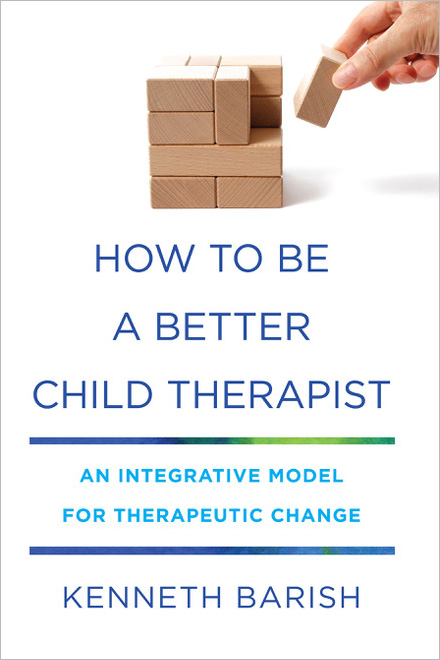How to Be a Better Child Therapist
 Title: How to Be a Better Child Therapist: An Integrative Model for Therapeutic Change
Title: How to Be a Better Child Therapist: An Integrative Model for Therapeutic ChangePublished by: W. W. Norton & Company
Release Date: August 21, 2018
Pages: 320
ISBN13: 978-0393712346
Buy the Book: Amazon, Barnes & Noble, IndieBound, Books-A-Million, Amazon
Overview
An integrative approach for child therapists of all disciplines and at all levels of training and experience.
How to Be a Better Child Therapist is an innovative contribution to the theory and practice of child therapy. Drawing on several decades of experience, Kenneth Barish presents a comprehensive, multi-faceted approach to therapeutic work with children and families, based on a contemporary understanding of children’s emotions and emotional needs. This book offers a new theoretical integration, an in-depth discussion of the essential processes of child therapy, and a wealth of practical recommendations to help child therapists solve the varied problems presented to us in daily clinical work.
Part 1 provides a theoretical foundation. Barish demonstrates how emotional and behavioral problems of childhood are most often caused by vicious cycles of painful emotions and pathogenic family interactions. Successful therapy arrests this malignant development and sets in motion positive cycles of healthy emotional and interpersonal experiences—increased confidence and engagement in life and more affirming interactions between parents and children. Over time, children and adolescents develop a less critical inner voice and more positive expectations for their future—a new sense of what is possible in their lives.
Part 2 describes 10 principles that guide our efforts toward this overarching therapeutic goal. Barish offers advice on how we can improve all aspects of clinical work with children: How can we engage more children in treatment? Why is empathy essential to children’s emotional health and effective therapy? How do children learn to regulate their emotions? What is the role of play in contemporary child therapy? How can we combat a child’s discouragement and self-doubt? How can we overcome children’s resistance to talking about bad feelings?
Part 3 presents a framework for therapeutic work with parents. Barish describes general principles for strengthening family relationships as well as practical plans for solving many common problems of their daily family life. He offers strategies for helping children who have difficulty with separations, doing homework, getting ready in the morning, or going to sleep at night; children with tantrums and uncooperativeness, rudeness and disrespect, sibling conflicts, and addiction to video games—problems for which parents, often urgently, ask our help. How to Be a Better Child Therapist is both inspiring and practical, essential reading for therapists of all theoretical orientations who work with children and families.
Reviews
“Ken Barish, a master clinician, has done a wonderful job of translating his clinical sensitivity and attunement into principles and methods that are eminently usable. He is an excellent teacher and explicates beautifully both his thinking and what he actually does in his office. The book is filled with practical suggestions not only for working with children but also for helping repair family units.”
—Ellen Wachtel, PhD, JD, author of Treating Troubled Children and Their Families
“As in his prior works, Ken Barish has once more demonstrated the quintessence of the evidence-based practitioner. His writing is clear. His theoretical conceptualizations are brilliant. His translation of theory into practice is masterful. This book should be required reading for every professional working with troubled children. It is wisdom, pure and simple.”
—Marshall P. Duke, PhD, Charles Howard Chandler Professor of Psychology, Senior Faculty Fellow, Emory Center for Ethics, Emory University
“How to Be a Better Child Therapist is a deeply thoughtful integration of theory, technique, content, and process. Starting with the emotional experiences of the child, Barish integrates interventions and thought processes into a beautiful mosaic of intuitive science and refined art that will be of enormous value to child clinicians.”
—Steve Tuber, PhD, ABPP, author of Starting Treatment with Children and Adolescents
“This book is testament to the wisdom and generosity of Ken Barish. It describes an approach to child therapy that is clinically informed, science based, and emotionally focused. Child therapists who aspire to be consistently transformative would do well to read this volume.”
—Tim Cavell, PhD, University of Arkansas